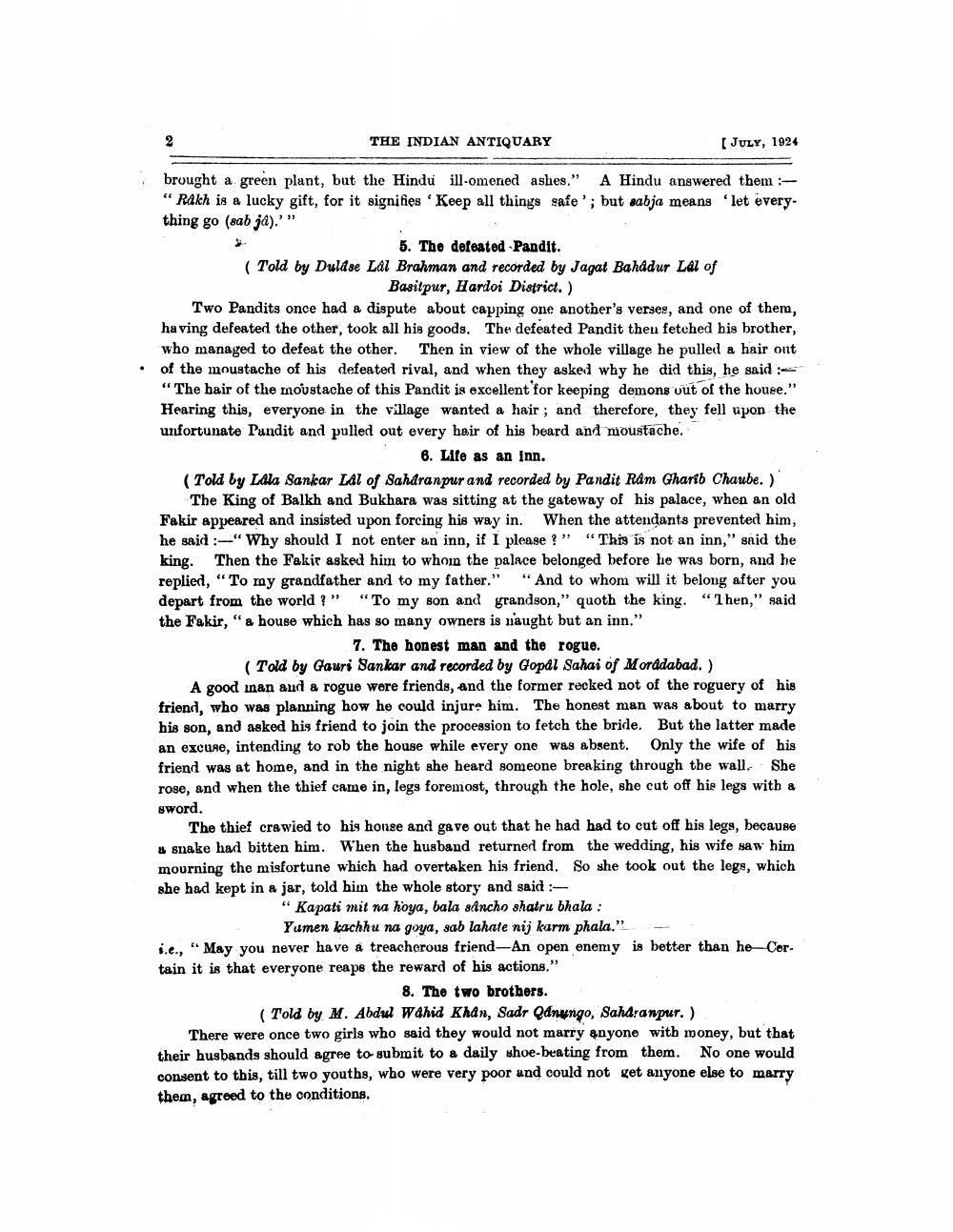________________
THE INDIAN ANTIQUARY
(JULY, 1924
brought a green plant, but the Hindu ill-omened ashes." A Hindu answered them "Rakh is a lucky gift, for it signifies Keep all things gafe'; but aabja means 'let every thing go (sab ja).'"
5. The defeated -Pandit. (Told by Duldse Lal Brahman and recorded by Jagat Bahadur Lal of
Basitpur, Hardoi District. ) Two Pandits once had a dispute about capping one another's verses, and one of them, having defeated the other, took all his goods. The defeated Pandit then fetched his brother, who managed to defeat the other. Then in view of the whole village he pulled a hair ont of the moustache of his defeated rival, and when they asked why he did this, he said: "The hair of the moustache of this Pandit is excellent for keeping demons out of the house." Hearing this, everyone in the village wanted a hair ; and therefore, they fell upon the unfortunate Pandit and pulled out every hair of his beard and moustache.
6. Life as an inn. (Told by Lala Sankar Lal of Saharanpur and recorded by Pandit Ram Gharib Chaube. )
The King of Balkh and Bukhara was sitting at the gateway of his palace, when an old Fakir appeared and insisted upon forcing his way in. When the attendants prevented him, he said :-"Why should I not enter an inn, if I please?" "This is not an inn," said the king. Then the Fakir asked him to whom the palace belonged before he was born, and he replied, “To my grandfather and to my father." "And to whom will it belong after you depart from the world?" "To my son and grandson," quoth the king. "Then," said the Fakir, "a house which has so many owners is naught but an inn."
7. The honest man and the rogue. (Told by Gauri Sankar and recorded by Gopal Sahai of Moradabad. ) A good inan and a rogue were friends, and the former recked not of the roguery of his friend, who was planning how he could injure him. The honest man was about to marry his son, and asked his friend to join the procession to fetch the bride. But the latter made an excuse, intending to rob the house while every one was absent. Only the wife of his friend was at home, and in the night she heard someone breaking through the wall. She rose, and when the thief came in, legs foremost, through the hole, she cut off his legs with a sword.
The thief crawied to his honse and gave out that he had had to cut off his legs, because # snake had bitten him. When the husband returned from the wedding, his wife saw him mourning the misfortune which had overtaken his friend. So she took out the legs, which she had kept in a jar, told him the whole story and said :
"Kapati mit na hoya, bala sincho shatru bhala:
Yumen kachhu na goya, sab lahate nij karm phala." -- i.e., "May you never have a treacherous friend-An open enemy is better than he-Cor. tain it is that everyone reaps the reward of his actions."
8. The two brothers. (Told by M. Abdul Wahid Khan, Sadr Qanungo, Saharanpur. ) There were once two girls who said they would not marry anyone with money, but that their husbands should agree to submit to a daily whoe-beating from them. No one would consent to this, till two youths, who were very poor and could not get anyone else to marry them, agreed to the conditions.




